Brian Michael Bendis's Hollywood memoir-in-comics Fortune & Glory was republished about two years ago, for no obvious anniversary- or thematically-related reason. At the time, I thought it was just a random new edition, but now it's clear that it was setting up for what we might as well call a sequel.
Fortune & Glory: The Musical was published at the end of January - I don't think it was serialized first, which is a little unusual for a book written by a guy like Bendis and published by an outfit like Dark Horse - and it tells a different story of a younger Bendis getting pulled into writing stuff for other creative media. While the first F&G centered on trying to turn his creator-owned early noir GNs into movies - Spoiler alert! it didn't quite happen, though Bendis got contacts and contracts and some income for a few years and other things eventually did get made - this second one is about one project that we readers might not have known Bendis was ever part of.
The famously...um, troubled Broadway musical of the early Teens, Spider-Man: Turn Off the Dark [1], had a book attributed to director Julie Taymor, playwright Glenn Berger, and (after a hasty rewrite during previews) playwright and comics scripter Roberto Aguirre-Sacasa. But it was no secret that other writers, including several comics writers, had been part of the project earlier. And Bendis was one of them, having been pulled in by Marvel head Avi Arad in 2004 to meet with Taymor and, everyone hoped, write the book of this musical.
(The music and lyrics were always going to be by Bono and The Edge of U2, and they were.)
The Musical is written by Bendis and features him as the main character, with roughly the same character design as the Bendis-drawn original F&G. But this time the art is by Bill Walko, with colors by Wes Dzioba and letters by Joshua Reed. It is the story of his involvement with Turn Off the Dark - which is actually pretty short and minor - as well as loosely-related material about his youth and the usual how-I-got-into-comics stuff.
Bluntly, Bendis took a couple of meetings with Taymor (one by phone, one after being flown down to LA), where he was impressed by her energy and passion but reacted really badly to two major pieces of her vision. First, that the musical should end, like a comic book, with a big "To Be Continued!" message - but he thought he could finesse that. Second, and more seriously, that she wanted to change Spider-Man's origin from the standard radioactive spider-bite, so that instead Peter Parker got his powers by praying to the Greek goddess Arachne.
(That stayed in the final work, more or less, so it clearly was a deal-breaker for Taymor. I'm more surprised that Marvel allowed it; they could have fired her instead and gone with another director. But I suppose this was post-bankruptcy, pre-Iron Man Marvel, a company more willing to take a crazy chance on someone who was well-known and successful in her area of expertise.)
So Bendis wrote up a treatment, and had another meeting to pitch it. He did not include the Arachne origin, and got only about that far into the pitch before Taymor blew up, and Bendis's involvement in the project quietly ended. (Bendis thought the project ended, and was surprised when the musical popped back up a few years later.)
That, as I hinted above, is only one small thread in The Musical - maybe 15% of the pages at most. It's not a long story, and not a lot happens. Most of the book is flashbacks to Young Bendis, dewy-eyed and obsessed with comics, bugging people like Walt Simonson and making crappy comics as a teenager and, eventually, forging an indy self-published crime-comics career in his twenties.
I don't know if anyone will come to The Musical for that story, but, if you're a Bendis fan, you'll probably enjoy it. It's the standard story of a lot of fans-turned-pro, and Bendis tells it with a lot of self-awareness and humor. Walko brings a slightly cartoony, caricatured line that adds energy and big facial expressions to pages with lots of captions and dialogue.
The Musical does not provide much background on Turn Off the Dark; Bendis was only involved briefly and inconclusively several years before it actually happened. But it's an amusing "creative people are obsessive weirdoes with quick tempers" story, and the rest of the material in the book is at least loosely and vaguely connected to that story.
[1] I actually saw Turn Off the Dark on Broadway with my two kids. Sadly, I saw it after the retool, when it was just kooky and not full-on insane. I didn't write about it at the time, and that was fifteen years ago, so all I have are vague memories. It was very technically impressive and full of excellent on-stage talent doing impressive things, but the story was...well, I don't want to say "a confused mess," since that would be insulting, but it wasn't the most clear and understandable thing I've ever seen.




















 English (US) ·
English (US) ·